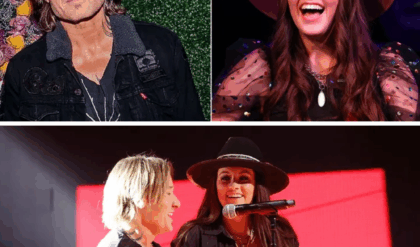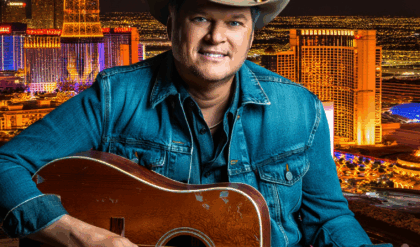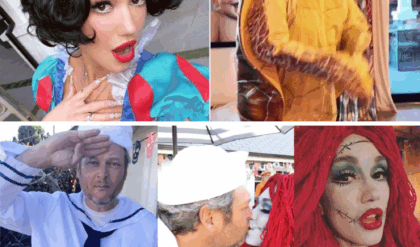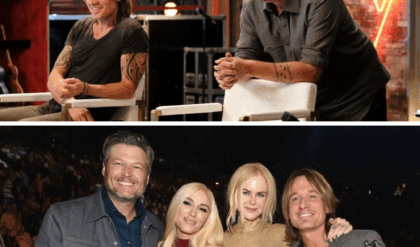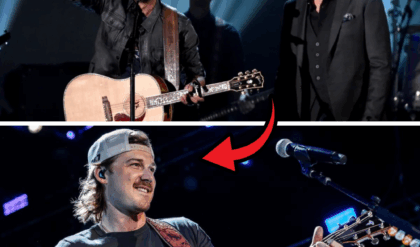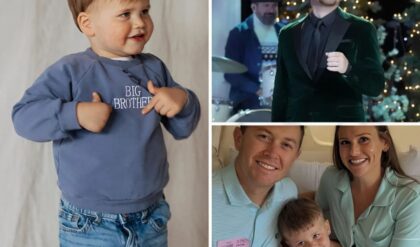London’s West End, that glittering nexus of velvet curtains and whispered arias, witnessed a moment of pure theatrical alchemy last night when Andrew Lloyd Webber, the maestro whose melodies have haunted stages for nearly four decades, took to the piano at the iconic London Palladium to accompany rising soprano sensation Rachel Zegler in a breathtaking rendition of “Wishing You Were Somehow Here Again” from The Phantom of the Opera. The October 5, 2025, performance—part of Zegler’s sold-out solo concert debut—marked not just a generational handoff but a seismic collision of eras, with the 77-year-old composer embodying the Phantom’s shadowy allure while the 24-year-old Zegler channeled Christine Daaé’s ethereal vulnerability. As Webber quipped from the keys, “This is the first time I’ve ever accompanied anybody, in any theatre, anywhere,” the sold-out crowd of 2,300 erupted in a standing ovation that echoed like the opera house’s fabled chandelier crashing down. In a night laced with Sondheim standards, pop anthems, and Broadway nods, this unscripted finale stole the spotlight, proving that some ghosts never fade—they evolve.
The London Palladium, with its art deco grandeur and history of hosting legends from Judy Garland to The Beatles, felt like the perfect crypt for this resurrection. Zegler’s concert, billed as “Zegler Sings: Echoes and Arias,” was a whirlwind tapestry of her eclectic influences: a gritty “Stars” from Les Misérables that had patrons gripping their seats (one audience member later dubbed it “Javert’s revenge, soprano-style”), a mashup of “Waiting on a Wish” from Disney’s forthcoming Snow White and “Somewhere Over the Rainbow” that blended her cinematic shine with Ozian whimsy, and a powerhouse “Rainbow High” from Evita that paid homage to her recent West End triumph. Guest star Ramin Karimloo, the baritone powerhouse who’s stalked the Phantom’s lair on Broadway and beyond, joined for duets from Funny Girl (“People”) and Sunday in the Park with George (“Move On”), their voices weaving a bridge between Zegler’s youthful fire and Karimloo’s seasoned timbre. But it was Webber’s entrance—unannounced, unassuming, in a tailored black suit that mirrored the Phantom’s cape—that transformed the evening from memorable to mythic.
Webber, knighted in 1992 and the Tony-winning titan behind a dozen megamusicals, has long been the opera ghost’s architect. Born in 1948 to a musical dynasty—his father a King’s College organist, his brother Julian a cellist cellist—Lloyd Webber’s path was etched in symphonies from cradle to conservatory. By 17, he was penning Joseph and the Amazing Technicolor Dreamcoat with Tim Rice, a biblical rock opera that foreshadowed his flair for spectacle. Jesus Christ Superstar (1970) scandalized with its electric guitars and Herod’s disco strut; Evita (1978) immortalized Eva Perón’s ascent in “Don’t Cry for Me Argentina.” But The Phantom of the Opera, premiered in 1986 at Her Majesty’s Theatre, was his magnum opus—a $8 million gamble (equivalent to $22 million today) inspired by Gaston Leroux’s 1910 novel and Ken Hill’s 1984 operatic adaptation. With lyrics by Charles Hart and a libretto co-crafted by Richard Stilgoe, it fused Puccini-esque romance with rock flourishes, birthing hits like “The Music of the Night,” “Think of Me,” and the titular showstopper. Starring Michael Crawford as the masked Erik and Sarah Brightman (Webber’s then-wife) as Christine, it shattered records: over 15,000 performances on Broadway alone, $6.5 billion in global grosses, and translations into 15 languages. The chandelier drop? A hydraulic marvel that still thrills 13,000 weekly attendees worldwide.
For Zegler, slipping into Christine’s corseted shoes—even for one aria—was a full-circle coronation. The New Jersey native, born in 2001 to Colombian and Polish parents, burst forth as a high schooler belting “Shallow” on YouTube, snagging Maria in Spielberg’s 2021 West Side Story remake at 19. Her Maria was no porcelain doll but a firebrand—raw, rhythmic, rain-soaked in that iconic “Tonight” quintet—earning Golden Globe nods and Oscar buzz. The Hunger Games: The Ballad of Songbirds and Snakes (2023) cast her as the defiant Lucy Gray Baird, her folk-tinged “The Hanging Tree” haunting the franchise’s dystopian edges. Then came Snow White (slated for 2026), where she voices the titular dreamer, infusing “Someday My Prince Will Come” with feminist grit amid live-action debates. But the stage called louder: her Eva Perón in Jamie Lloyd’s stripped-bare Evita revival this summer at the London Palladium was a revelation—sold-out for 12 weeks, with Zegler’s “Buenos Aires” a clarion call that Webber himself hailed as “the best I’ve ever heard.” “Rachel’s voice is a once-in-a-generation instrument,” he gushed post-Evita, eyes twinkling over a post-show claret. “She doesn’t just sing Evita; she embodies the revolution.”
The duo’s rapport, forged in Evita‘s rehearsal rooms, crackled with mentor-protégé electricity. Webber, who’s battled health woes—a 2023 battle with cellulitis that hospitalized him mid-Cats revival—has become an unlikely champion of youth. He’s greenlit drag-infused Cats for Broadway 2026, Jamie Lloyd’s deconstructed Sunset Boulevard (starring Nicole Scherzinger), and now teases The Illusionist, a new musical with Lloyd directing. Zegler, ever the quick study, credits Webber’s “endless curiosity” for her Palladium pivot. “Andrew saw something in me during Evita—this hunger to haunt the classics,” she shared backstage, still flushed from the finale, her gown a cascade of midnight silk echoing Christine’s Act II elegance. Preparation for “Wishing You Were Somehow Here Again” was intimate: a private piano session at Webber’s countryside estate, where they dissected the aria’s grief-laced longing—Christine’s lament at her father’s grave, a spectral bridge to the Phantom’s obsession. “It’s not just sad; it’s defiant,” Zegler noted, her soprano soaring from mezzo whispers to crystalline highs as Webber’s fingers danced the ivories, improvising a subtle celesta trill that nodded to the score’s ghostly motifs.
The performance itself was electric poetry. As house lights dimmed to a phantom fog, Zegler entered stage left in a diaphanous white gown, hair pinned with a single black rose—a subtle Phantom homage. Webber, spotlit at the grand Steinway, struck the opening chords: a mournful oboe melody (pre-recorded, but his piano wove it seamlessly). Zegler’s voice emerged like mist from the lake scene—tentative at “You were once my one companion,” building to a wrenching “Angel of Music, you destroyed me!” The audience, a mix of West Side Story superfans in their 20s and Phantom diehards clutching Playbills from ’86, held collective breath. Midway, Webber leaned into the mic for a spoken interlude—”Let the audience feel the phantom’s pull”—before crescendoing into the aria’s flute-like flourishes. Her final “Somehow here again” hung suspended, a silken thread snapping into thunderous applause. “It was like the score came alive in real time,” tweeted attendee @TheatreKid87, whose clip amassed 500,000 views overnight. Critics were rapt: The Guardian‘s review called it “a duet across decades, Zegler’s bloom against Webber’s evergreen thorn,” awarding five stars.
This wasn’t mere nostalgia; it was a manifesto for musical theater’s future. Webber, thrice-married and a father of five, has long navigated scandal—his Brightman union dissolved amid Phantom‘s premiere, fueling tabloid tales of art imitating life. Yet at 77, post-cancer remission and with a Netflix Jesus Christ Superstar in the works (featuring a female Jesus, no less), he’s reinvigorating his canon. “Phantom’s not a museum piece; it’s a living curse,” he told BBC Radio 2 pre-concert, hinting at a film remake “sooner than you think—perhaps with Rachel as Christine.” Zegler, who’s sparred with online trolls over her Snow White casting, sees the aria as armor. “Christine’s not a victim; she’s the voice that unmasks the monster,” she reflected in a green-room chat, sipping chamomile amid wilting lilies. Her trajectory—from Shazam! Fury of the Gods villainess to Y2K scream queen—positions her as Broadway’s next siren, with whispers of a Wicked Glinda or Romeo + Juliet revival.
The Palladium night rippled outward. Social media exploded: #PhantomDuet trended globally, with fan edits splicing Zegler’s take over the 2004 movie’s graveyard scene. Ticket resale sites crashed as scalpers hiked secondary prices to £500. Webber, ever the showman, announced an encore: a one-night Phantom gala at Royal Albert Hall on November 1, with Zegler as special guest Christine opposite Karimloo’s Phantom. Proceeds benefit the Andrew Lloyd Webber Foundation’s arts education arm, which has funneled £100 million to UK youth programs. “Rachel’s the Christine this era needs—fierce, flawed, unforgettable,” Webber beamed post-bow, the duo linking arms center stage as confetti mimicked falling rose petals.
In a post-pandemic theater scarred by closures and streaming wars, this union feels like resurrection. Phantom, which shuttered briefly in 2020 and relaunched sans its iconic mask during COVID, has clawed back to 90% capacity at His Majesty’s. Zegler’s Palladium sell-out—four shows, 9,200 tickets—signals a youth quake: Gen Z flocking to flops and frills, TikTok tutorials on “Think of Me” hairdos going viral. As the curtain fell on “Wishing You Were Somehow Here Again,” with Zegler draping an arm over Webber’s shoulders, it wasn’t farewell but foreplay—a tease of collaborations to come. Will Zegler don the white dress full-time? Star in that rumored Phantom screen epic? Only the masked man knows. But one aria in, they’ve already dropped the chandelier on our hearts. In the opera of life, some music doesn’t end; it echoes eternally.
